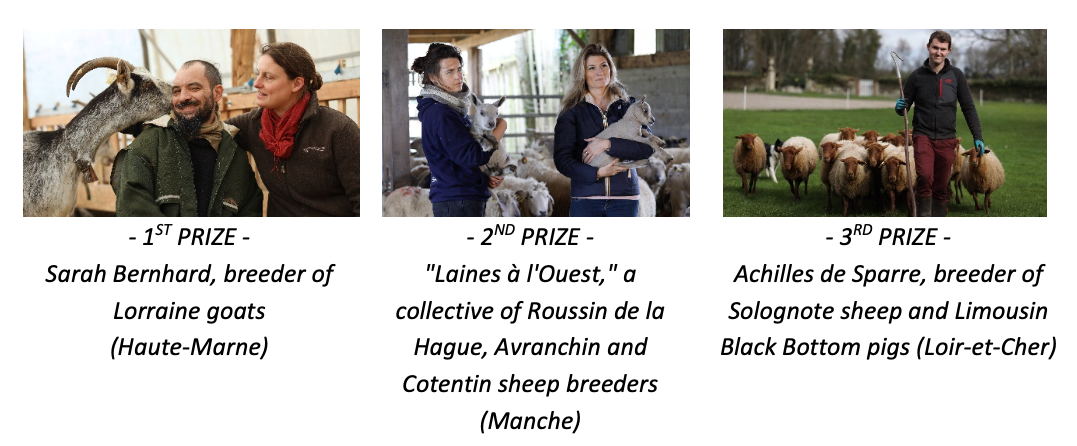Paris, March 2, 2020 - For the 8th consecutive year, the "Fondation du Patrimoine National Animal Agrobiodiversity Prize" has been awarded on the occasion of the International Agricultural Show. Two breeders and one association received awards for their commitment to the preservation and promotion of endangered French agricultural breeds.
Biodiversity strengthening the image of "Made in France," with projects promoting cosmetics, textiles and living heritage
For this 8th edition of the event, Sandrine Arcizet, journalist/TV presenter specializing in animals and new patron of the Prize, went to meet the winners. Sandrine's interviews bring out not only their stories and their plans for the future, but above all their commitment to preserving French agricultural biodiversity.
1st Prize: Sarah Bernhard, breeder of Lorraine goats Grand-Est 52 - Haute-Marne
Endowment: 10 000 €
City: 52500 Pierrefaites
For the past 4 years, Sarah has raised a herd of Lorraine goats in free-range conditions. In order to promote this so-called small-population goat breed (around 700 head in France) and contribute to its wider renown, the breeder had the idea of creating a range of cosmetics based on goat milk: solid soaps, lip balms, body butters, etc.
To do so, she has set up a production laboratory allowing her to produce several cosmetic products, the production and marketing of which will be launched in spring 2020.
2nd Prize: "Laines à l’Ouest", a collective of Roussin de la Hague, Avranchin and Cotentin sheep breeders Normandie 50 - Manche
Endowment: 6 000 €
City: 50430 Lessay
This collective of breeders and textile designers wishes to commercialize the wool of several endangered breeds of Normandy sheep: Roussin de la Hague (around 3,000 heads in France), Avranchin sheep (around 700) and Cotentin sheep (around 1,000). Since 2017, Laines à l'Ouest has been working on the production of knitting yarn made in Normandie, collecting fleece from 20 breeders in the region. Each year, the volume of wool collected doubles; this requires that measures be taken now to improve sorting and storage methods and increase the visibility of the collective amongst knitters outside the region.
In 2020, the collective hopes to be able to remunerate its project leaders and start to work with a small processing operation, and thus to further promote the advantages of wool produced from local breeds. Its objective: to promote awareness among the general public of the French heritage of animal husbandry and artisanal craft.
3rd Prize: Achille de Sparre, breeder of Solognote sheep and Limousin Black Bottom pigs. 41 – Loir-et-Cher Centre-Val-de-Loire
Endowment: 4 000 €
City: 41250 Tour-en-Sologne
Achille De Sparre raises Solognote sheep and Limousin Black Bottom pigs, two old breeds with small numbers (approximately 3,000 heads and approximately 120 heads respectively), in free-range conditions. Active since 2017, he sells products made from these two breeds (meats, prepared meat products) and provides eco-grazing services accompanied by educational communications activities. Achille De Sparre's project is to develop direct sales by creating a farm store. In order to promote the commercial development of farm-to-table products, several breeders based in Sologne, including Achille de Sparre, are working to establish a protected designation of origin (AOP).
French agricultural biodiversity is threatened as well
Clearly the issue of the decline in biodiversity is a crucial one, with 1 million animal and plant species now threatened with extinction(1). Among these, one-third of the French breeds of farm animals are endangered(2), though historically France has had a wide variety of ovine, equine, poultry, bovine, caprine and porcine breeds. In many regions, breeders are taking action to conserve this biodiversity, a veritable genetic heritage that constitutes the wealth of the French agricultural landscape. Developing eco-grazing projects, creating educational farms, promoting production through direct sales... there are as many projects as there are passionate breeders.
To support their commitment, the Fondation du Patrimoine and Ceva Santé Animale created the National Animal Agrobiodiversity Prize in 2012 with support from a private sponsor. Placed under the high patronage of the Ministry of Agriculture, the prize rewards original actions taken for the preservation and commercial development of French agricultural breeds with small populations. In selecting the three winners, the jury bases its decision on three major criteria: the economic value of the project, its social or environmental impact on the region, and the awareness promotion and communications activities undertaken in the interest of preserving a given breed.
"Animal biodiversity is an absolutely crucial issue today, in particular considering the phenomenon of climate change that we must now face. It is important that we give our support to these breeders, who, in all regions of France, are engaged in sustainable agriculture projects and are working on the commercial development of animal biodiversity so as to help preserve our ecosystems, our regions and our genetic heritage. It's one of our nation's greatest treasures!", says Dr. Marc Prikazsky, CEO of Ceva Santé Animale.
"The Fondation du Patrimoine has been tasked with safeguarding both our built heritage and our natural heritage. We do not distinguish between nature and culture, biodiversity and human activities. Our local agricultural breeds and varieties have shaped the landscape in the countryside, and still today they continue to preserve them. They are rich in a unique genetic heritage. With this prize, we are proud to provide our support to breeders who are working to preserve this living heritage, which belongs to us all." Célia Verot, General Director of the Fondation du Patrimoine.
1 « Le dangereux déclin de la nature », IPBES (ONU), 05-2019
2 Ministry for Agriculture - Journal officiel - « Les races bovines, ovines, caprines et porcines reconnues en France », 27 juillet 2018
Further Information:
- List of winners from previous editions: click here
- Royalty-free visuals available on request or for download: click here
>> PDF version: 2020-02_National Animal Agrobiodiversity Prize_EN.pdf (1.23 MB)

 Corporate Website
Corporate Website
 Africa
Africa
 Argentina
Argentina
 Asia
Asia
 Australia
Australia
 Belgium
Belgium
 Brazil
Brazil
 Bulgaria
Bulgaria
 Canada (EN)
Canada (EN)
 Chile
Chile
 China
China
 Colombia
Colombia
 Denmark
Denmark
 Egypt
Egypt
 France
France
 Germany
Germany
 Greece
Greece
 Hungary
Hungary
 Indonesia
Indonesia
 Italia
Italia
 India
India
 Japan
Japan
 Korea
Korea
 Malaysia
Malaysia
 Mexico
Mexico
 Middle East
Middle East
 Netherlands
Netherlands
 Peru
Peru
 Philippines
Philippines
 Poland
Poland
 Portugal
Portugal
 Romania
Romania
 Russia
Russia
 South Africa
South Africa
 Spain
Spain
 Sweden
Sweden
 Thailand
Thailand
 Tunisia
Tunisia
 Turkey
Turkey
 Ukraine
Ukraine
 United Kingdom
United Kingdom
 USA
USA
 Vietnam
Vietnam

